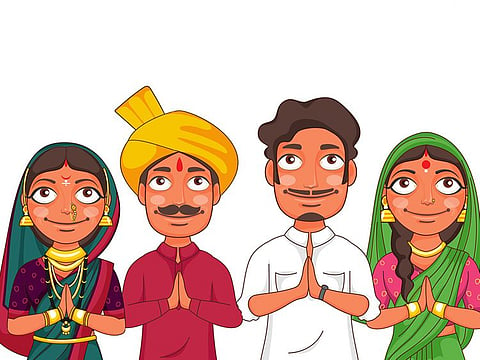New India needs vitality, creativity, and critical thinking
Part IV of the series on 75 years of India’s Independence

James H. Cousins’ idea of the Indian renaissance was discussed in the previous column, https://gulfnews.com/opinion/op-eds/the-irish-connection-to-indias-renaissance-1.90195144. Cousins, the Irish Theosophist, believed that nationalism was not merely a political, but spiritual movement. Agreeing with him, Sri Aurobindo, the poet, philosopher, and great yogi, also strove to awaken the nation’s soul so that, beyond decolonisation from British rule, a much more comprehensive Indian renaissance could take place.
In his series on the subject, Sri Aurobindo poses the question, like Cousins, about the appropriateness of the term “renaissance” for the transformation of India: “There is a first question, whether at all there is really a Renaissance in India. That depends a good deal on what we mean by the word; it depends also on the future, for the thing itself is only in its infancy and it is too early to say to what it may lead.”
Sri Aurobindo immediately compares what happens in India with the European renaissance: “The word carries the mind back to the turning-point of European culture to which it was first applied; that was not so much a reawakening as an overturn and reversal, a seizure of Christianised, Teutonised, feudalised Europe by the old Graeco-Latin spirit and form with all the complex and momentous results which came from it.”
Next, he points out crucial difference between the two, as also the greater similarity between the Indian and the Irish situation: “That is certainly not a type of renaissance that is at all possible in India. There is a closer resemblance to the recent Celtic movement in Ireland, the attempt of a reawakened national spirit to find a new impulse of self-expression which shall give the spiritual force for a great reshaping and re- building….” Cousins would have been happy that Sri Aurobindo also believed in a worldwide spiritual brotherhood between decolonising nations.
Also Read: India’s Renaissance is still unfinished
Also Read: The Irish connection to India’s Renaissance
Agreeing also with Cousins’ point on the unbroken continuity of Indian civilisation, Sri Aurobindo adds the caveat that this was true only for “Indian spirituality which has always maintained itself even in the decline of the national vitality.” What is more, it was certainly spirituality that had “saved India always at every critical moment of her destiny, and it has been the starting point too of her renascence. Any other nation under the same pressure would have long ago perished soul and body.”
Thus, carrying the metaphor of body and spirit forward, Sri Aurobindo argues that the unfolding of the Indian renaissance would require a new body, cured of old defects, but still able to express its native genius, which was spiritual: “The shaping for itself of a new body, of new philosophical, artistic, literary, cultural, political, social forms by the same soul rejuvenescent will, I should think, be the type of the Indian renascence,-- forms not contradictory of the truths of life which the old expressed, but rather expressive of those truths restated, cured of defect, completed.” He then proceeds to outline three characteristics of ancient Indian society.
Master-key of the Indian mind
It is this part of his argument that becomes crucial to India@75. Sri Aurobindo, following Swami Vivekananda, says that “spirituality is indeed the master-key of the Indian mind”; that ancient India is marked by “her stupendous vitality, her inexhaustible power of life and joy of life, her almost unimaginably prolific creativeness”; and, finally, that the “third power of the ancient Indian spirit was a strong intellectuality.”
If so, what was wrong with current day India? According to Sri Aurobindo, there has been a civilizational decline, characterised by “three movements of retrogression.” First, a “shrinking of that superabundant vital energy and a fading of the joy of life and the joy of creation”; secondly, “a rapid cessation of the old free intellectual activity”; and, finally, the diminution of the power of Indian spirituality. It was under such conditions of decline that the European powers swept over India to wrest control over it.
Under the impact of British colonialism, much that was old and moribund was destroyed; the nation itself might have perished under such adversities. But luckily, there was some life left still, which responded with renewed vigour: “It revived the dormant intellectual and critical impulse; it rehabilitated life and awakened the desire of new creation; it put the reviving Indian spirit face to face with novel conditions and ideals and the urgent necessity of understanding, assimilating and conquering them.”
It is clear that Sri Aurobindo’s earlier enthusiasm for the renaissance is now substituted by the urgency of what needs actually to be done in the future: “The recovery of the old spiritual knowledge and experience in all its splendour, depth and fullness is its first, most essential work; the flowing of this spirituality into new forms of philosophy, literature, art, science and critical knowledge is the second; an original dealing with modern problems in the light of the Indian spirit and the endeavour to formulate a greater synthesis of a spiritualised society is the third and most difficult.”
Sri Aurobindo is not the only thinker who extends the value and implications of the Indian reawakening to the global, even species stage. James H. Cousins had also ended his book title with a similar hope and prophecy.
Sri Aurobindo, however, goes much farther than others in asserting that the rise of India, the rediscovery of her ancient genius, her capacity to excel in the modern world, and her new realisations would have a crucial role to play in the very future of humanity.
It is to these radical ideas that we will turn next.
[To be continued]



